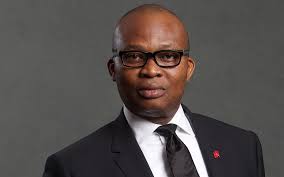
Tony Elumelu , Chairman Board of Directors , United bank for Africa , UBA , no doubt ,is a philanthropist to the core ; generosity is one of his core values and very much in his blood . Unfortunately and ironically too, his bank , under his watch , however , is doing the opposite when it is more a necessity and right . Like a man that kills or abandons a goose that laid golden egg , this bank has turned it to a tradition to shortchange its investors in the time of harvest .
United Bank for Africa Plc , UBA, no doubt , is a bank with size advantage and heavy potentials. Total assets increased Y-o-Y by 36.95 % from N5.62trn in 2019 to N7.69trn in 2020 ; total equity grew Y-o-Y by 21.10 % from N597.98bn in 2019 to N724.15bn in 2020. These potentials expose this financial supermarket , the self acclaimed Africa’s global bank, to mega opportunities and provide sinecure that drive its operations. The 2020 audited financials filed at the Nigerian Stock Exchange (NSE) shows that UBA’s gross earnings grew by 10.8 percent to N620.4 billion, compared to N559.8 billion recorded in the corresponding period of 2019.
However ,in spite these huge potentials and improvement in figures ,its industry’ s and leadership reputation is ,no doubt ,under serious threat in the last few years for its alleged anti investors’ posture on dividend payment ; this is allegedly attracting scorn and opprobrium against the brand . Most of its investors who spoke with us under anonymity decried this yearly routine of miserable non-dividend payout despite its claim to improved profitability could not hide their disgust particularly with the latest payment for the 2020 financial year . UBA gave a meager sum of N11.97 billion as the final dividend to shareholders out of N113billion net income. This translates 52k out of N3.20k ,its earning power or earning per share in 2020.
. A close scrutiny or detailed analysis of its financial books exposes the above pictures better and more vividly .The Bank’s Profit Before Tax was N131.9 billion, compared to N111.3 billion at the end of the 2019 financial year ; its Profit After Tax rose remarkably by 27.7 percent to N113.8 billion compared to N89.1 billion recorded at the end of the 2019 financial year. These are ,no doubt , outstanding figures, though not by any means seismic relative to some of its peers . However , the point of argument remains , when compared with the improvement registered and its peers , the dividend paid raised an eyebrow from investors .
Investors’ grouse was prompted by the fact that despite the huge improvement claimed by the management in 2020 financial year they were allegedly shortchanged by the management ; they received a rude shock of their lives as their dividends nosedived heavily with a 35k as final dividend, a lower dividend, compared to a sum of N0.80 declared last year, indicating a decline of 56.25% YoY . This becomes more irritating when compared with the large gap between it and its tier 1 peers . For instance , Zenith Bank , another tier 1 bank with almost equal resources , gave out N3.00 as Guaranty Trust Bank, with lesser assets , has just announced N2.70k .
.
UBA is notorious for unstable dividend track record. Recently , most shareholders of the Tier 1 banking group expressed some disappointment in the fall in the banking group’s total dividend payout of N0.52 for 2020 (down from N1.00 in 2019) despite the rise in its profits. Equity holders had expected a marginal increase in payout above the 2019 payment of N1.00 per share. The declared final dividend represents a dividend yield of 2.98% on the market price of N 7.40 ; 7 percent dividend yield on the total dividend of 52k , at the same stock price of N7.40 . This is a proportion of the market price of the share which a shareholder has received out of the cost of his investment in one share. Moreover , this is in spite of its relatively high earning yield or rate of returns for a shareholder’s investment in one share standing at N43.00 or 43 % , from every N100.00 worth of share . Its earning power or earning per share at N3.20k, some argued, is also relatively high to warrant higher dividend if the bank truly made that money .
In the last five years its dividend moved from 75k in 2016 to 85k in 2017 ; in 2018 , there was no improvement registered as its dividend stayed flat 85 k . In 2019 , perhaps ,due investors agitation ,it paid N1.00 per share . However , the 2020 dividend paid became the worst in the last five years as it doled out a meager 52k per share
But the bank’s chief executive officer, Mr. Kennedy Uzoka, expectedly is putting up his defence too. He said the reduced dividend was to allow the bank achieve further headroom in strengthening its capacity expand its operations and deliver stronger earnings in the near term.
.
However, its investors too are not folding their arms ; they are ,indeed, fighting back . The bank’s alleged unfriendly investor’s dividend policy is ,indeed, generating untold negative impact on its market capitalization. Currently, its market capitalization ,a factor of its share price and outstanding shares ,stands N244.5billios, when some of its peers are hitting trillions naira or close to that . This has continued to raise storm and doubt against the bank and cast shadow on its brand image as it is limiting its capacity to create wealth for its shareholders.
This is more reason why its stock is believed to be undervalued though some analysts still believed ,it is still overvalued at that low price relative to its peers. The value of share as indicated by its price has continued to received investors’ poor perception. .Although , in 2020 the Tier 1 banking group’s share price rose by 20.98% , the lender’s YTD price showed a -16.76 % decline as of 9th March 2021.
The current share price of United Bank for Africa (UBA) is N 7.15. UBA began the year with a share price of 8.65 NGN but has since lost 17.34% off that price valuation, ranking it 150th on the NSE in terms of year-to-date performance. Shareholders’ worries are further compounded by the fact that UBA has lost 12.8% of the stock’s value from February 12 to date . Investigations revealed some investors based on privilege information started offloading their investments to reap gains from capital appreciation to avoid loosing both sides .
UBA’s market performance has not been impressive in the recent years. According to Simply Wall Street , a firm of financial analysts based in New York City , its 7 day return is 10.1 % down against the industry -5.4 % and the market -2.1 % ; its one year return against the industry and the market is not impressive as well. . Its share underperformed the banking industry which returned 48.1 % over the past year and the market which returned 57.4 % over the past year . At its current share price of N7.15 k its share price is believed to be overvalued by 147.9 % as some analysts put its fair value N2.88k .
There is another angle through which this poor dividend decision is perceived though no concrete evidence to support the allegation . Some analysts are raising doubt about the lender’s claim on profitability . Is this not just a mere creative accounting ? This may not be farfetched. Years back , one of the gimmicks adopted by banks was to declare profit to create image of good performance and sound health . However, when it came to paying dividend they resorted to borrowing to pay dividend . In the recent years , some banks have been suspected to have adopted a new strategy. They either not pay or pay miserable amount after declaring whopping profit. A major rationale behind this suspicious attitude is a claim that they are retaining or moving back the rest into their operations.
This is presently raising suspicion and dust against some banks . This is the fate of the United Bank for Africa in the last financial year of 2020 . Some shareholders and analysts are finding it difficult to believe the amount declared is real , though no evidence to back up this allegation. The bank had declared a profit before tax up by 18.49 % Y-o-Y from N111.29bn in 2019 to N131.86bn in 2020; earnings per share increased Y-o-Y by 26.98 % from N2.52 in 2019 to N3.2 in 2020.




